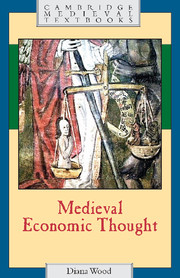Book contents
- Frontmatter
- Contents
- Preface
- List of abbreviations
- Introduction: problems, evidence, and background
- 1 Private property versus communal rights: the conflict of two laws
- 2 Wealth, beggary, and sufficiency
- 3 What is money?
- 4 Sovereign concerns: weights, measures, and coinage
- 5 The mercantile system
- 6 The just price and the just wage
- 7 The nature of usury: the usurer as winner
- 8 The theory of interest: the usurer as loser
- Conclusion
- Appendix: Notes on the main writers and anonymous works mentioned in the text
- Glossary of terms
- Select bibliography
- Index
- Cambridge Medieval Textbooks
4 - Sovereign concerns: weights, measures, and coinage
Published online by Cambridge University Press: 05 June 2012
- Frontmatter
- Contents
- Preface
- List of abbreviations
- Introduction: problems, evidence, and background
- 1 Private property versus communal rights: the conflict of two laws
- 2 Wealth, beggary, and sufficiency
- 3 What is money?
- 4 Sovereign concerns: weights, measures, and coinage
- 5 The mercantile system
- 6 The just price and the just wage
- 7 The nature of usury: the usurer as winner
- 8 The theory of interest: the usurer as loser
- Conclusion
- Appendix: Notes on the main writers and anonymous works mentioned in the text
- Glossary of terms
- Select bibliography
- Index
- Cambridge Medieval Textbooks
Summary
INTRODUCTION: THE CONNECTION
The connection between weights, measures, and coinage was a close one in the medieval period, for control of all of them was part of the exercise of sovereignty. As the Dominican Ptolemy of Lucca (d. c. 1328), pupil of Aquinas, appreciated:
weights and measures … are as necessary as the coinage for preserving the government of any lordship, since they are used in the payment of tributes, since their use decreases quarrels and protects fidelity in purchases and sales, and, finally, since they, like coins, are instruments of human life and, even more than coinage, imitate natural action … it seems that weights and measures take their origin from nature more than coinage does, and therefore they are even more necessary in a republic or kingdom.
Our aim is to pinpoint the origins of weights, measures, and coinage, before exploring the development of sovereign rights to control their standards.
Control of the standards enabled a ruler, or his deputy, to regulate the most vital aspects of people's existence. The standard controlled the boundaries of the all-important land on which they lived, and which provided sustenance for them and their dependants and a surplus for the market. Within the market the standard controlled the amount or size of essential commodities – food and drink, and the cloth which covered human nakedness. Weights and measures regulated exchange just as much as money did.
- Type
- Chapter
- Information
- Medieval Economic Thought , pp. 89 - 109Publisher: Cambridge University PressPrint publication year: 2002



